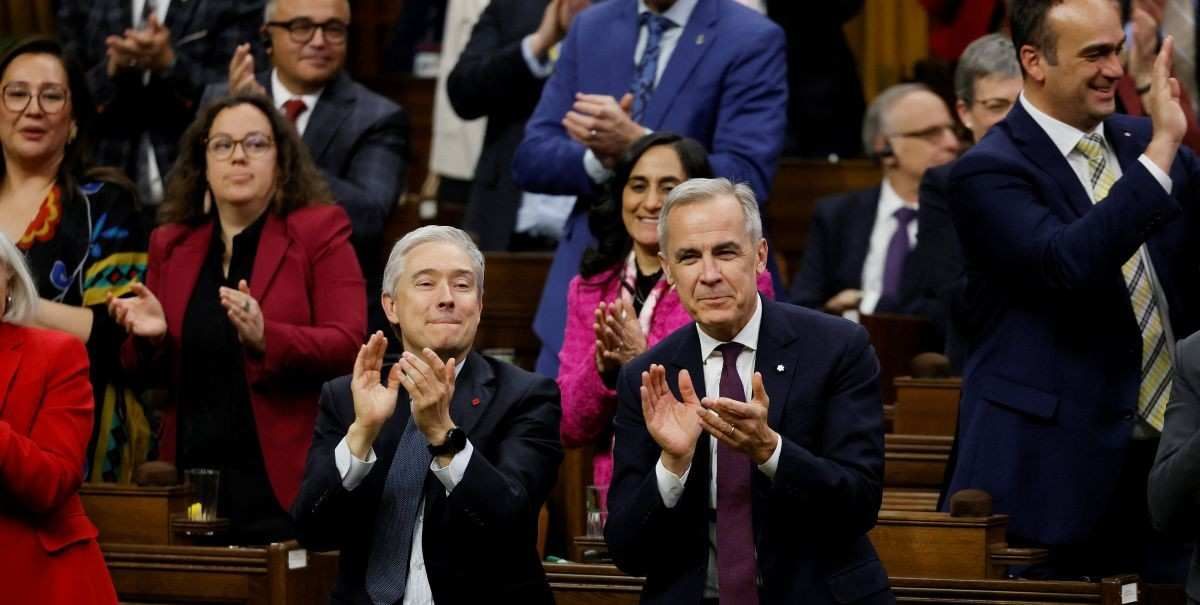Canada’s six-month old minority government survived a de facto confidence vote on its first budget yesterday, avoiding the possibility of a Christmas election. Carney now has a mandate to run the second-highest deficit in Canadian history, at CA$78.3 billion, in order to implement wide-ranging industrial policy that includes infrastructure, resource development, and defense. It’s a blow for the opposition parties, most notably the Conservatives, whose leader Pierre Poilievre is facing a leadership review vote by his party at its annual convention in January.
What will the budget mean for Canada? Over the next five years, the government will invest CA$115 billion in infrastructure spending, including electricity-grid upgrades and high-speed rail, as well as in major projects, including port infrastructure, LNG plants, and to support critical minerals development projects that could challenge China’s dominance in the sector. It will spend CA$25 billion on housing, a major election issue, as well as an extra CA$81.8 billionon defense. A “Buy Canadian” procurement regime will steer federal contracts toward domestic suppliers for all these engagements.
But the plan comes withan average CA$64.3 billion annual deficit for the next four years, double what had been projected by the previous government. According to the Fitch ratings agency, Canada’s general government-debt-to-GDP ratio will rise to 91.8% in 2026 and 98.5% in 2027, compared with 88.6% in 2024 and nearly double its AA rating median of 49.6%. To counter the fiscal pressure, the budget promises to cut 10% of public service jobs to balance the government’s operating expenditures, but capital spending will still have Ottawa in the red.
Those factors made the budget unpalatable to both the right-wing Conservatives and the left-wing New Democrats while two other smaller parties, the Bloc Quebecois and the Greens, refused to support it due to its failure to increase Old Age security payments and its removal of the federal emissions cap on Canada’s oil and gas industry.
So then how did the budget pass? Carney’s government was three seats shy of a majority when the bill was introduced on Nov. 4. That same day, however, a Conservative MP, Chris d’Entremont,crossed the floor to the Liberals, and a day later, another Conservative, Matt Jeneroux, announced he would resign his seat in the spring, ostensibly for family reasons, amid rumours that he was also considering joining the government.
That left Carney still in need of two crucial votes, or a combination of votes and abstentions. He got the support of Elisabeth May, leader of the Green Party, in exchange for a promise to meet Canada’s climate targets in the Paris Agreement to reduce greenhouse gas emissions by 40-45% below 2005 levels by 2030, though it is not clear how that will be achieved with the new energy investments in the budget. Four opposition MPs then abstained, two each from the Conservatives (Jeneroux, and another with serious health issues) and the New Democrats (one whose local mayors and Indigenous leaders did not want an election, and another who saw benefits in the budget for her riding). This allowed the budget to pass by a vote of 170 to 168.
Where does this leave the opposition? The drama has weakened Conservative leader Poilievre. Many MPs were already unhappy with the party’s election defeat in April, blaming Poilievre for failing to pivot to the issue of opposing US President Donald Trump. The Conservative leader also lost his own seat and had to win a seat in a by-election in order to return to Parliament in September.
But the biggest problem in the Conservative Party is governance. In the wake of the budget floor crossing, Poilievre and his advisors reportedly threatened MPs to prevent further defections, leading one to liken their styleto that of “the Sopranos”. This could spell trouble for Poilievre at an upcoming Conservative leadership review in January, required when the party loses an election: a score under 80% could severely undermine his ability to remain leader.
At the other end of the political spectrum, the NDP are fighting for relevance after the 2025 election reduced them to seven seats and saw their leader resign. The party is voting to choose a new leader in March 2026, making the prospect of an election now without a permanent leader an unappealing prospect. However, the decision by two members to abstain revives bitter memories of the party’s deal to prop up the previous Liberal government, which angered many members and became a factor in the New Democrats’ defeat.
How stable is the government?
With the budget passed, the Liberals don’t need to worry about another confidence vote until the fall of 2026. But nothing prevents the government from going to the polls at any time, if it thinks it could be to its advantage. The longest a government can stay in power in Canada is five years, but the average lifespan of a government without a locked-in majority of Parliament is about two years. The timing of the next election could hinge on many factors, including striking a trade deal with Trump, the state of the Canadian economy, and the strength – or weakness - of opposition leaders.
